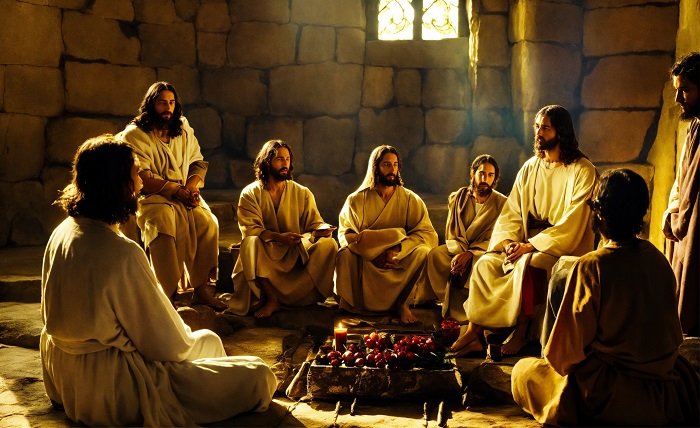Maundy Thursday Meaning: Its Significance in Christianity

Maundy Thursday meaning revolves around its importance in Christian tradition as the day that commemorates the Last Supper of Jesus Christ with his disciples. This day, observed on the Thursday before Easter, is significant because it marks the institution of the Holy Eucharist and the washing of the disciples’ feet. Understanding Maundy Thursday meaning allows believers to reflect on humility, service, and sacrifice. Each year, Christians worldwide celebrate Maundy Thursday with special prayers, services, and rituals, keeping the essence of the Maundy Thursday meaning alive.
Historical Background of Maundy Thursday Meaning
The Maundy Thursday meaning is deeply rooted in biblical history. It is based on events described in the New Testament, where Jesus shared a final meal with his disciples before his crucifixion. During the Last Supper, Jesus washed the feet of his disciples, teaching them humility and service. The term “Maundy” comes from the Latin word mandatum, meaning “commandment,” referring to Jesus’ commandment to love one another. Exploring the historical context of Maundy Thursday meaning helps Christians appreciate the spiritual lessons embedded in this sacred day.
Religious Significance of Maundy Thursday Meaning
The Maundy Thursday meaning carries immense religious significance. It commemorates the institution of the Holy Communion, reminding Christians of Jesus’ sacrifice for humanity. The washing of feet ritual demonstrates humility and the importance of serving others. The Maundy Thursday meaning also underscores the themes of obedience, love, and selflessness in Christian teachings. Through prayer and reflection on Maundy Thursday meaning, believers strengthen their faith and prepare for the solemn events of Good Friday, making this day a cornerstone of Holy Week observances.
Traditions and Customs Related to Maundy Thursday Meaning
Various traditions highlight the Maundy Thursday meaning across Christian communities. Churches often conduct special services, reenacting the Last Supper and performing foot-washing ceremonies to honor Jesus’ example. In some cultures, “Maundy money” is distributed to the poor, reflecting the Maundy Thursday meaning of charity and service. Families may gather for special meals, prayers, and scripture readings. By participating in these customs, believers connect with the deeper aspects of Maundy Thursday meaning, fostering a sense of community, faith, and devotion.
Maundy Thursday Meaning in Different Christian Denominations
The Maundy Thursday meaning can vary slightly across Christian denominations, yet its core essence remains the same. In Roman Catholic, Anglican, and Lutheran traditions, the Maundy Thursday meaning is highlighted through the Eucharist and foot-washing ceremonies. Protestant communities may focus more on the Last Supper and teaching about love and service. Eastern Orthodox Christians observe Maundy Thursday meaning through the Divine Liturgy and holy rituals. Understanding the diverse ways the Maundy Thursday meaning is celebrated enriches the appreciation of Christian faith and its teachings globally.
Maundy Thursday Meaning in Modern Times
In contemporary society, the Maundy Thursday meaning continues to inspire acts of service, reflection, and spiritual devotion. Churches around the world hold online services, public processions, and charitable events to uphold the Maundy Thursday meaning. The focus on humility, love, and sacrifice remains relevant in modern life, reminding people to prioritize compassion and community. Even outside religious settings, understanding Maundy Thursday meaning encourages individuals to practice kindness and empathy, demonstrating how this ancient observance maintains its significance today.
Lessons from Maundy Thursday Meaning
The Maundy Thursday meaning teaches valuable life lessons for believers and non-believers alike. It emphasizes humility, service to others, and love as central virtues. By reflecting on Maundy Thursday meaning, people are reminded of the importance of putting others before themselves and embracing compassion in daily life. The day also encourages self-examination, spiritual growth, and a deeper connection with faith. Ultimately, the Maundy Thursday meaning serves as a moral compass, guiding individuals toward kindness, generosity, and devotion, echoing the principles taught by Jesus Christ during the Last Supper.
Conclusion
Maundy Thursday meaning is a profound reflection of love, service, and spiritual devotion in Christianity. From its historical roots in the Last Supper to modern-day observances, the Maundy Thursday meaning reminds believers of humility, sacrifice, and compassion. Through rituals such as foot-washing, Holy Communion, and charitable acts, the Maundy Thursday meaning continues to inspire communities worldwide. By understanding and embracing the Maundy Thursday meaning, Christians connect with their faith, honor the teachings of Jesus Christ, and embody the values that define the essence of this sacred day.
FAQs
1. What is the Maundy Thursday meaning?
The Maundy Thursday meaning refers to the commemoration of Jesus’ Last Supper with his disciples, the institution of the Holy Communion, and the act of foot-washing.
2. Why is Maundy Thursday celebrated?
Maundy Thursday is celebrated to honor Jesus’ teachings on humility, service, love, and his preparation for the events of Good Friday.
3. What traditions are associated with Maundy Thursday meaning?
Traditions include the Holy Communion, washing of the disciples’ feet, prayers, scripture readings, and acts of charity such as distributing Maundy money.
4. Does Maundy Thursday meaning differ across Christian denominations?
Yes, while the core meaning remains the same, some denominations focus more on the Eucharist, foot-washing, or public services to reflect the Maundy Thursday meaning.
5. How can one observe Maundy Thursday meaning today?
One can observe Maundy Thursday meaning by participating in church services, performing acts of service, reflecting on humility, and practicing love and compassion toward others.





